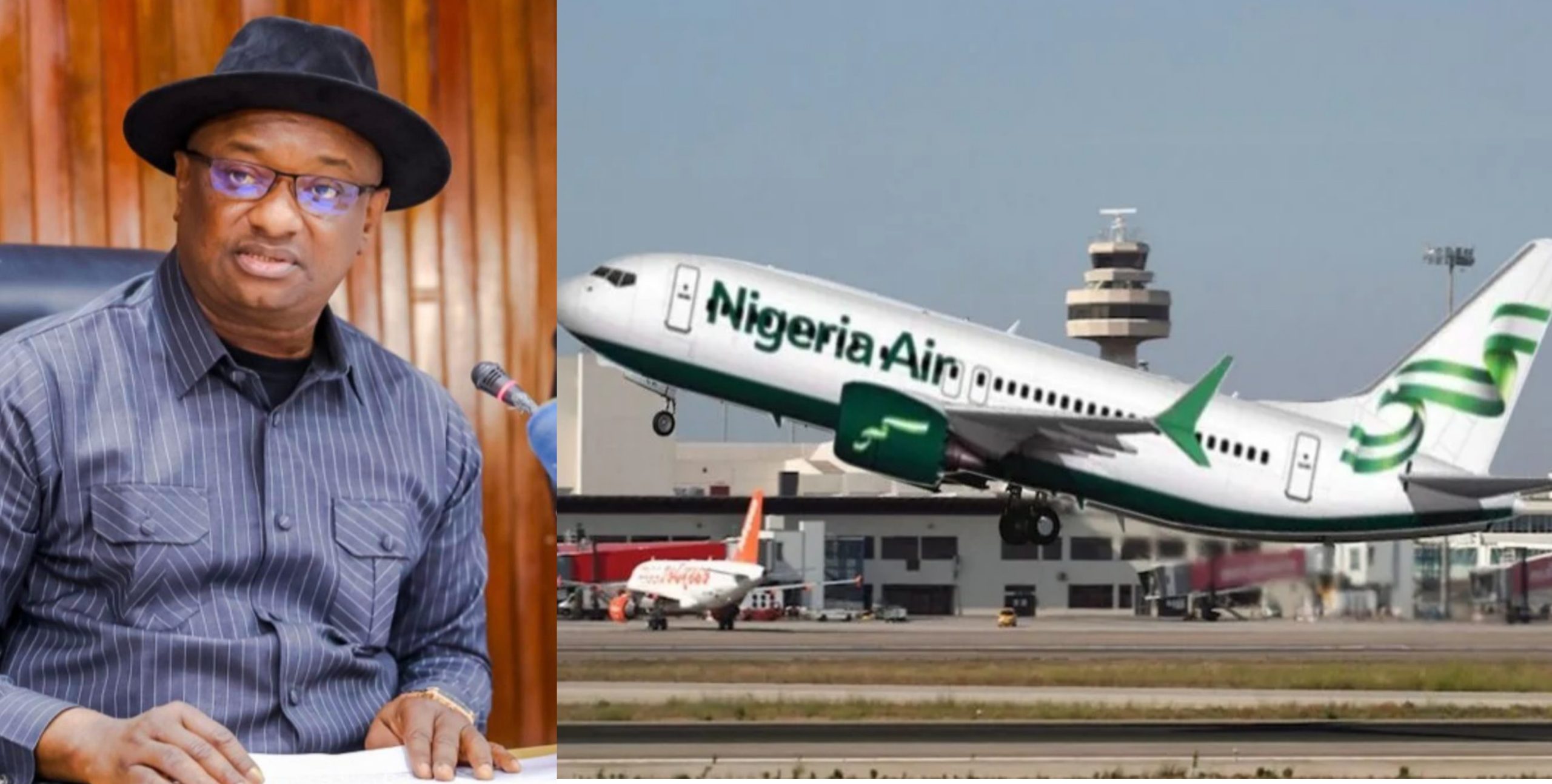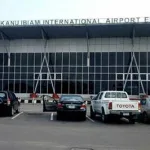Former commandant of the Murtala Mohammed International Airport, Lagos, Group Captain John Ojikutu, has called on the Minister of Aviation and Aerospace Development to withdraw the idea of floating a new national carrier, saying experience with the defunct Nigeria Airways is a pointer to the fact that it will just be another wasteful adventure.
In an exclusive interview with Prime Business Africa, Captain OJukutu said that given the state of Nigeria’s economy which is reeling under the burden of high debt, it will be difficult to set up a national carrier that requires not less than $200 million.
Join our WhatsApp ChannelAside from a debt burden of about N87.38 trillion, Nigeria’s economy is also plagued by forex illiquidity that has made the naira record an all-time low of N1,400 and above per $1 at the official market between last week and this week.
The Minister of Aviation, Festus Keyamo, had in an interview with Channels TV on Wednesday disclosed that there are plans to start a new publicly-owned carrier.
“We will establish a proper national carrier and people are talking to us about it. The Arabs are talking to us, the Chinese are talking to us, and the Americans are talking to us on this already,” Keyamo said in the interview.
READ ALSO: FAAN Spent N1bn In 1 Year On Lagos-Abuja Trips – Keyamo
He also dismissed calls to designate any of the domestic airlines as flag carriers, arguing that it would be unfair to choose one and neglect others.
Ojikutu warned that Keyamo might be toeing the path of his predecessor, Senator Hadi Sirika, who signed a deal with Ethiopian Airlines to birth Nigeria Air towards the end of the last administration.
It later turned out to be that the aircraft flown into Nigeria on the day of the purported launch was an Ethiopian Airlines plane hastily rebranded to Nigeria Air. Details of the deal made public showed that Ethiopian Airlines was to own 49%, Nigerian investors holding 46%, and the government retaining a 5% stake raising uproar about the level of control the Nigerian government has in the joint venture.
“There is no country today in the world that is running a national carrier apart from Africa. How many of them in Africa that are progressing apart from Ethiopian Airlines which is disciplined to be running as a national carrier because they don’t have any other resources to depend on. All American airlines are all flag carriers. Even British Airways we are talking about is already a flag carrier, not a national carrier.”
He said Nigerian Airways died because of poor management and anybody that does not know what killed it should not venture into creating another one.
He said instead of embarking on setting up a new national carrier, the government can decide to assess the liabilities and assets of some airlines currently under receivership by Asset Management Corporation of Nigeria (AMCON) like Arik Air and Aero Contractors and see how they can be converted into a national carrier.
“Everything we are doing now, we are just wasting money that is not there. Why should we be talking about a national carrier? To set up a national carrier, and you don’t have money at all, you are going to put in a minimum of $200 million, where is it? and you are borrowing money everywhere. Even if you are going to lease, you are going to buy at least six aircraft and you cannot put each one of them without spending at least $40 million,” Ojikutu told Prime Business Africa.
He further suggested that the government can designate some local airlines as flag carriers and give them all the necessary support to be the nation’s pride wherever they go to in international destinations.
“Designate two flag carriers, Arik and Aero one. Air Peace one. Arik and Aero to be regional and continental; Air Peace to be intercontinental. Your flag carrier is as good as your national carrier. All these foreign airlines that are coming in here, like the British Airways, are all flag carriers, and we treat them the way we treat a national carrier,” Ojikutu stated.
On the relocation of the Federal Airport Authority of Nigeria (FAAN) headquarters from Abuja to Lagos, the aviation expert said FAAN mustn’t be domiciled in the airport to effectively manage the airport. He said: “Coming to Lagos is to be closer to the MMA which I call the fattest cow where the money is.”
“I said If they have to come to Lagos, move them to Lagos Island, there are so many buildings that are empty there they can use as their headquarters, must it be in the airport?” he queried.
“The only reason they want to be in the airport is for interference with the job of the airport manager.”
Encouraging Local Airlines to Thrive
He also stressed that local airlines should be encouraged and supported to thrive and compete favourably with the foreign airlines operating in the country. One of the ways to do that, according to him, is to restrict foreign airlines coming to Nigeria from interfering in the domestic routes operated by local airlines. He said: “No foreign airlines must be allowed to fly to Lagos and Abuja at the same time. It is either you fly to Lagos or you fly to Abuja; don’t fly to Lagos and Abuja.”
He maintained that doing so would create business for the local airlines plying those routes that would convey passengers between the two cities. He said such practice is obtainable in many parts of the world and deliberately done to encourage local airlines.
Grading of Airports
As part of measures to create a conducive environment for domestic airlines to thrive, Ojikutu also called on FAAN to grade the airports to have differences in charges. This, he said, would help reduce the charges for the domestic airlines in some of the airports based on the grading.
Airports Concessioning
The aviation expert also hinted at the need for concession services in the airports to reduce government spending on maintenance and also ensure efficiency in service delivery by the private operators. He said the government needed not to embark on the renovation of the e-wing terminal of the Murtala Muhammed International Airport (MMIA), Lagos which was done recently. According to him, the government would not have spent money on it, rather, it would get money from concessioning it.
Foreign Airlines Trapped Funds Controversy
The retired Nigerian Air Force officer also called on the government to release the outstanding debt owed to foreign airlines stating that they deserve to repatriate the funds. He warned that if foreign airlines stop coming to Nigeria as they have threatened because of their trapped funds, it could lead to the collapse of the aviation industry in Nigeria.
“If the international airlines stop coming to Nigeria, the aviation industry would collapse,” he said.
“There is no reason they should not pay them that money. They made that money for us, and the money is with us. So, who are the people that are collecting the dollars? They pay for their services in dollars. Passengers’ services they pay to FAAN is in dollars which is a minimum of $200 million dollar a year. Landing and parking, they pay a minimum of $150 million dollars a year; fuel marketers, they pay them too, in dollars.
“Obasanjo told them in 2007, all these dollars you are collecting, deposit them in the central bank and collect naira. Where are the dollars that they have been collecting? They will collect dollars and still go to the central bank and ask for money if they want to do anything outside this country.”
While stating that there is no proper accountability among the agencies in the aviation sector, he called on the Federal Government to do an audit of the earnings of those agencies such as FAAN, Nigeria Civil Aviation Authority (NCAA), and Nigeria Airspace Management Agency (NAMA) among others.
Ojikutu cautioned Keyamo to be careful about the people he listens to and the kinds of decisions he takes to avoid ruining the aviation industry in the future.
Victor Ezeja is a passionate journalist with seven years of experience writing on economy, politics and energy. He holds a Master's degree in Mass Communication.




















Follow Us